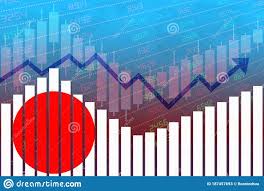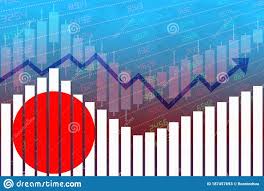
The Japanese economy recovered from a COVID-induced slowdown at a slower-than-expected pace in the second quarter, according to statistics released on Monday, raising concerns about whether consumption will increase sufficiently to support the country's long-delayed, shaky recovery.
The Ukraine crisis and rising commodity prices have hampered Japan's economic recovery, even as increased spending boosted growth in April-June.
"Consumption and capital expenditure will continue to drive growth in July-September. But momentum may not be that strong as rising inflation is cooling household spending," said Atsushi Takeda, chief economist at Itochu Economic Research Institute.
"While domestic demand may continue to expand, falling exports could put a brake on Japan's recovery," he said.
Indeed, a recurrence of COVID infections, declining global GDP, supply restrictions, and rising raw material prices have clouded Japan's future.
The world's third-largest economy expanded an annualised 2.2 per cent in April-June, according to government data, marking the third consecutive quarter of growth but falling short of median market predictions of a 2.5 per cent increase.
It follows a revised 0.1 per cent increase in GDP in January-March, when rising COVID cases hampered spending.
The increase was mostly driven by a 1.1 per cent increase in private consumption, as restaurants and hotels saw demand rebound following the removal of pandemic-related restrictions.
Capital expenditure, another important driver of April-June growth, grew 1.4 per cent from the previous quarter, above the median market projection of 0.9 per cent growth, according to the statistics.
However, the gain in second-quarter consumption was less than the 1.3% expected by the market, putting uncertainty on whether the resurgence in consumer spending will last.
According to some analysts, a rise of COVID infections, as well as recent price increases for a wide variety of daily commodities, may deter consumers from indulging on leisure and dining out.
Wage earners' salary declined 0.9% from the previous quarter, compared to a 0.1% drop in January-March, indicating that growing living costs were already affecting household income.
Worries over a worldwide downturn, fueled in part by a wave of monetary tightening by major central banks, have dimmed chances for a long-term revival in Japan's economy.
While domestic demand added 0.5 per cent point to April-June GDP, external demand neither added nor subtracted from growth, indicating declining support from the once-vibrant export industry.
"Looking ahead, there's downside risks to domestic demand due to a renewed spike in COVID cases. External risks are also skewed to the downside on heightening recession fears in the United States and Europe," said Toru Suehiro, an economist at Daiwa Securities.
To cushion the economic impact of rising living costs, Prime Minister Fumio Kishida directed his ministers on Monday to devise further measures to slow the rate of increase in fuel and food prices. Japan has lagged behind other major countries in fully recovering from the pandemic's impact due to sluggish spending, which has been blamed in part on activity limitations that lasted until March.
As a result, the Bank of Japan (BOJ) has become an outlier in the global monetary tightening phase that has swept across many nations amid increasing inflation.
Policymakers believe that pent-up demand will support consumption until salaries increase sufficiently to offset rising living costs. Analysts believe there is concern about whether corporations will raise wages as the dangers of decreasing global demand increase.
The BOJ has emphasised its determination to continue ultra-loose monetary policy even as inflation surpassed its 2 per cent target for the third month in a row in June, in order to ensure the economy's prolonged recovery is supported by healthy consumption and wage growth.
(Source:www.investing.com)
The Ukraine crisis and rising commodity prices have hampered Japan's economic recovery, even as increased spending boosted growth in April-June.
"Consumption and capital expenditure will continue to drive growth in July-September. But momentum may not be that strong as rising inflation is cooling household spending," said Atsushi Takeda, chief economist at Itochu Economic Research Institute.
"While domestic demand may continue to expand, falling exports could put a brake on Japan's recovery," he said.
Indeed, a recurrence of COVID infections, declining global GDP, supply restrictions, and rising raw material prices have clouded Japan's future.
The world's third-largest economy expanded an annualised 2.2 per cent in April-June, according to government data, marking the third consecutive quarter of growth but falling short of median market predictions of a 2.5 per cent increase.
It follows a revised 0.1 per cent increase in GDP in January-March, when rising COVID cases hampered spending.
The increase was mostly driven by a 1.1 per cent increase in private consumption, as restaurants and hotels saw demand rebound following the removal of pandemic-related restrictions.
Capital expenditure, another important driver of April-June growth, grew 1.4 per cent from the previous quarter, above the median market projection of 0.9 per cent growth, according to the statistics.
However, the gain in second-quarter consumption was less than the 1.3% expected by the market, putting uncertainty on whether the resurgence in consumer spending will last.
According to some analysts, a rise of COVID infections, as well as recent price increases for a wide variety of daily commodities, may deter consumers from indulging on leisure and dining out.
Wage earners' salary declined 0.9% from the previous quarter, compared to a 0.1% drop in January-March, indicating that growing living costs were already affecting household income.
Worries over a worldwide downturn, fueled in part by a wave of monetary tightening by major central banks, have dimmed chances for a long-term revival in Japan's economy.
While domestic demand added 0.5 per cent point to April-June GDP, external demand neither added nor subtracted from growth, indicating declining support from the once-vibrant export industry.
"Looking ahead, there's downside risks to domestic demand due to a renewed spike in COVID cases. External risks are also skewed to the downside on heightening recession fears in the United States and Europe," said Toru Suehiro, an economist at Daiwa Securities.
To cushion the economic impact of rising living costs, Prime Minister Fumio Kishida directed his ministers on Monday to devise further measures to slow the rate of increase in fuel and food prices. Japan has lagged behind other major countries in fully recovering from the pandemic's impact due to sluggish spending, which has been blamed in part on activity limitations that lasted until March.
As a result, the Bank of Japan (BOJ) has become an outlier in the global monetary tightening phase that has swept across many nations amid increasing inflation.
Policymakers believe that pent-up demand will support consumption until salaries increase sufficiently to offset rising living costs. Analysts believe there is concern about whether corporations will raise wages as the dangers of decreasing global demand increase.
The BOJ has emphasised its determination to continue ultra-loose monetary policy even as inflation surpassed its 2 per cent target for the third month in a row in June, in order to ensure the economy's prolonged recovery is supported by healthy consumption and wage growth.
(Source:www.investing.com)





